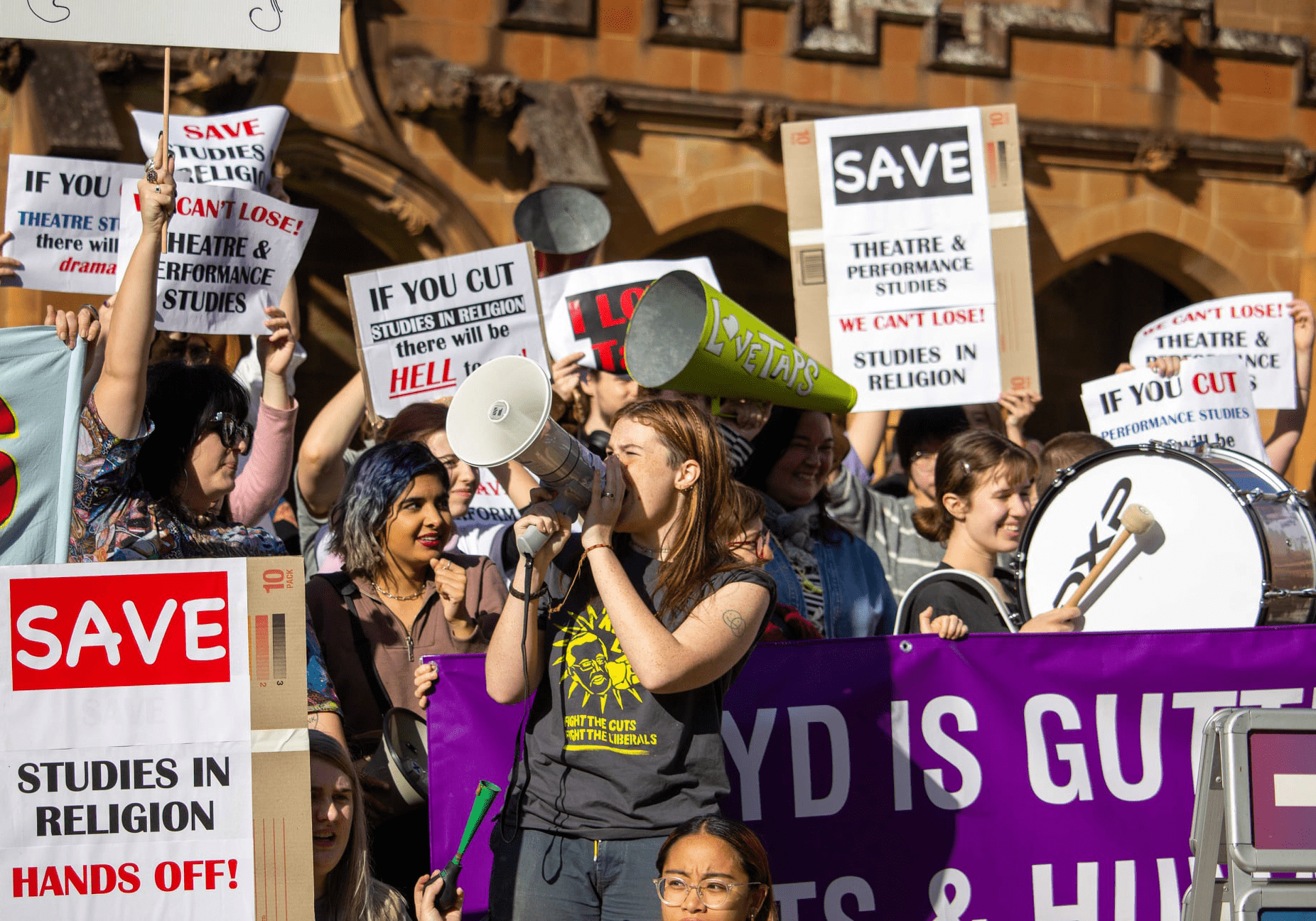Being a student at USyd can feel like being a drop in the ocean. We sit in our bedrooms each day, one blurred background awash in a Zoom gallery. We (try to) stay focused while our overworked and underpaid teachers attempt to conjure a miracle and make our online experience engaging.
We zone in and out, adrift.
Scott Morrison and the Liberal government’s tertiary education policies can feel like an overwhelming current: Arts fees are hiked, funding per student is slashed, university staff are excluded (three times) from JobKeeper.
The National Tertiary Education Union (NTEU) and student activist groups fight against the current. But sometimes it feels like we are in boats without oars; our education, at best, manages to tread water.
Instead of throwing a lifeline, University managers help push us under. The mini-Morrison Vice-Chancellors (and their corporate manager teams) slash jobs, capsize departments and throw degrees overboard. For them, a surplus is more valuable than our education. As the former interim Vice-Chancellor Stephen Garton described the University to me once: “It’s a business!”
There are, however, vital moments when enough drops converge to create a counter current.
For months, the Departments of Theatre and Performance Studies (TaPS) and Studies of Religion (SoR) have faced the axe in the Faculty of Arts and Social Sciences (FASS), despite FASS recording a $35 million surplus in 2020 and projecting a $135 million surplus in 2021. This $3.6 million cut, as Dean Annamarie Jagose’s story spun, was somehow necessary for the future sustainability of our education.
Students are often furious with management’s priorities and their disregard for quality education. The question is: What can we do about it?
As the cuts emerged last semester, staff in TaPS and SoR started a campaign to “Save USyd Arts.” Two online petitions quickly accrued over 2000 signatures collectively. In collaboration with student activists, a rally brought 100 staff and students together in the final week of Semester 1.
Stuck on Zoom in Semester 2, activism faced challenges. Importantly, however, the politics remained clear: build wide-spread, political opposition to the plan and present it in the Dean’s face, over and over again.
Sydney College of the Arts student and Save USyd Arts activist Isla Mowbray learned from the campaign that “there is power in collective action. We won this campaign through building mass support in the student body, through many lecture and tutorial announcements, passing motions and having conversations about why these cuts are happening more broadly.”
Students began by organising hundreds to sign an open letter to Dean Jagose. Motions opposing departmental cuts were passed in over 30 Zoom classes, one even to the Dean’s face during her guest lecture in FASS2100. Off the back of these motions, almost 150 students mobilised (with another 150 staff in attendance) to watch students grill the Dean at her weekly staff meeting. This meeting passed yet another motion of opposition to the cuts, again showing her the depth of opposition.
A week later, the Dean announced that Department cuts were off the table. Nick Reimer of the NTEU reflected, “when it becomes clear that the political price is too high, the financial imperatives miraculously disappear.”
Similarly, the Head of TaPS, Paul Dwyer, said that “to hear the Dean affirming the University’s commitment to the area of culture, including performing arts, was extremely heartening, and the student voice has been really important in this outcome.”
Despite reneging on departmental cuts, the Dean is still proposing curriculum reform. Undergraduate courses with less than 24 enrolled students could be cut; so too could postgraduate courses with less than 16 enrolled.
Students must pool together and again make a wave that crashes down on the Dean to save a diverse and quality education in FASS.
I encourage every student to join the ongoing Save USyd Arts campaign at the Education Action Group meetings and fight against every axe this University wields.
The Save USyd Arts campaign has shown that if students dare to struggle, students can dare to win.





